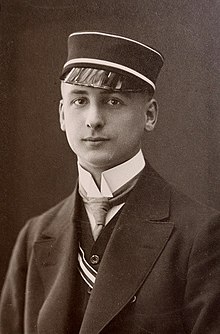Kurt Schmeisser (administrative lawyer)
Kurt Schmeisser (born August 18, 1889 in Magdeburg , † June 16, 1958 in Hanover ) was a German administrative lawyer .
Life
Schmeisser's father was the geologist Karl Schmeißer . Kurt Schmeisser attended the König-Wilhelm-Gymnasium (Breslau) . After graduating from high school in 1908, he worked in mining for a year because he wanted to pursue the career of senior mining official. He gave up these plans for health and other reasons and studied law at the Silesian Friedrich Wilhelms University . On November 25, 1909, "Graf Werfer" was reciprocated in the Corps Borussia Breslau . As a one-year volunteer , he served in 1910/11 with the 1st Silesian Hussar Regiment ("von Schill") No. 4 in Ohlau. He then performed an eight-week exercise with the Brown Hussars as a non-commissioned officer in the reserve. His squadron chief did not allow him to measure lengths . Already relatively old due to mining and military service and impaired by a panaritium while fencing, he was released from Borussia in October 1911 at his own request without a band . He received the ribbon back on August 3, 1912. After the legal traineeship, he was promoted to Dr. iur. PhD.
After his first traineeship in Zobten , he transferred to Prussia's internal administration as a government trainee with the government in Breslau in 1914 . Since 1913 lieutenant, he was orderly officer in the First World War at VI. Army Corps and the 12th Cavalry Brigade. In 1915 he fought on the Bug (river) and in Volhynia . In November 1918 he became engaged to Martha Carola König. The wedding took place on March 8, 1919 in Breslau. Then Schmeisser came as a government trainee to the district administrator of the Reichenbach district (Eulengebirge) , later to the government in Breslau. His daughter was born in December 1919 and his son in November 1922.
In 1921 he came to the police chief in Berlin as a government assessor . For a while he was an unskilled worker in the Prussian Ministry of the Interior. Since 1922 government councilor since 1924 senior government councilor , he was part of the senior presidium of the province of Brandenburg . From 1925 he was a consultant in the Prussian Ministry of the Interior, which he left at his own request the following year. He was appointed provisional in October 1926 and finally appointed district administrator in the Hirschberg district in the Giant Mountains on February 8, 1927 . In 1929 he came to the supervisory board of Ferngas-Niederschlesien AG. The Lower Silesian District Assembly elected him deputy chairman in 1931. In 1933 he came back to the Brandenburg High Presidium. In 1934 he was recalled by the Prussian State Ministry for political reasons and transferred to the government in Cologne . During the Second World War (around 1941) he was the state trustee of the Westdeutsche Bodenkreditanstalt Cologne. After the war he worked at the audit office of the Free and Hanseatic City of Hamburg and the Lower Saxony state audit office. Seconded as a government director , he headed the government in Aurich as acting president . After he and his wife had suffered a serious car accident in the spring of 1952, he came to the Lüneburg administrative district as Vice President . In retirement he was a councilor in Hanover and a member of the Lower Saxony State Court .
Honors
- Iron Cross 2nd Class (November 1914)
- Iron Cross 1st Class (1918)
- Order of Merit of the Federal Republic of Germany , 1st Class Cross of Merit
Individual evidence
- ^ Kösener Corpslisten 1960, 78 , 720
- ↑ Dissertation: The competence of the German empire to resolve disputes over the throne in a single state .
- ↑ daughter of the factory owner and captain d. R. König, member of the Corps Slesvico-Holsatia Hannover (WSC).
- ↑ a b c d Personal file of the Corps Borussia Breslau
- ↑ District of Hirschberg i. Rsgb. (territorial.de)
- ↑ Federal Archives
- ^ For the Westdeutsche Bodenkreditanstalt see Hypothekenbank Frankfurt
- ^ Deputy of the members of the Lower Saxony State Court since 1957
| personal data | |
|---|---|
| SURNAME | Schmeisser, Kurt |
| BRIEF DESCRIPTION | German administrative lawyer |
| DATE OF BIRTH | August 18, 1889 |
| PLACE OF BIRTH | Magdeburg |
| DATE OF DEATH | June 16, 1958 |
| Place of death | Hanover |
